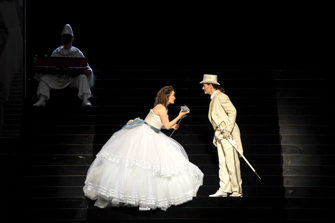
Richard Strauss’s Der Rosenkavalier, which has just opened at the Bastille Opera House in Paris in a production shared with the Salzburg Festival, feels like a regression in so many ways.
After the visceral violence of Strauss’s first two operas, Salome (1905) and Elektra (1909), which strain at the edges of tonality and good taste, Strauss took several steps back in this 1911 work by writing what looks like a sugar-coated comedy about Viennese high society in a harmonically more conservative idiom. And yet, with the help of his brilliant librettist Hugo von Hofmannsthal, Strauss managed to create an opera that is so much more profound than what might initially meet the ear and eye, combining reflection upon the passing of time with possibly the most glorious (and challenging) music ever written for the female voice.
Therein lies one of the greatest pitfalls of staging a successful production of Der Rosenkavalier: the three central female singers need to be very good to carry off the soaring lines of Strauss’s score. Mezzo-soprano Daniela Sindram in the breeches role of Octavian was for me the standout performer in this production, combining ardor and luster in her voice, and utterly believable as a gangly adolescent boy experiencing passion for the first time. The opening scene with his older lover, the Field-Marshall’s wife (Marschallin), was certainly the steamiest version I have seen, with Octavian even enjoying a postcoital cigarette as the curtain opens. Audiences in 1911 must have been scandalized and titillated in equal measure to find two women cavorting at the very beginning of the opera.
Soprano Erin Morley as the young Sophie, who captivates Octavian as he presents the silver rose to her on behalf of Baron Ochs, has the requisite purity of tone and youthful demeanor to carry off her part with aplomb. The way she is dressed up like a doll in the second act underlines the extent to which she is used as a commodity and/or plaything by both her father and Ochs.
Michaela Kaune’s Marschallin is vocally detailed but lacks the fullness of tone needed to dominate the stage; perhaps she is better suited to a smaller theater. Luckily, she came to the fore in the sumptuous final trio, and her parting from the stage after giving her blessing to the young lovers was truly affecting. Perhaps the voice of Anja Harteros (former winner of the Cardiff Singer of the World competition), who will be singing the role in some performances, will be better suited to the larger space.
The one essential male role, that of Baron Ochs, is here sung and acted with aplomb by Peter Rose, even though he lacks the truly deep bass notes that so distinctively conclude the second act.
While Herbert Wernicke’s production makes good use of the huge Bastille stage, with tall turning mirrors managing to give visually striking representations of the Marschallin’s bed chamber in Act I, the nouveau riche grandeur of Faninal’s mansion in Act II, and the inn to which Baron Ochs invites the young maid “Mariandel” (in fact, Octavian in disguise) in the final act, it is less effective on stage detail.
All too often the intricacies of the comic interplay are lost, especially in the first act when the boorish Ochs alternates between asking his cousin the Marschallin to help him with his forthcoming wedding and trying to seduce the maid. Also, the overlong opening scene of the final act (as various participants terrify and confuse Ochs in the inn as he sits down to dinner with “Mariandel”) lacked the visual ingenuity of other productions I have seen.
One novel idea introduced by Wernicke was to make the Marschallin’s servant boy Mohammed a traditional clown figure from the Italian commedia dell’arte, thereby steering clear of the problems associated with such a politically incorrect character.
The orchestra was in superb form throughout, especially the brass section, conducted as always with warmth and flair by Philippe Jordan, who must now rank as one of the most successful musical directors of the Paris Opera.
Favorite
